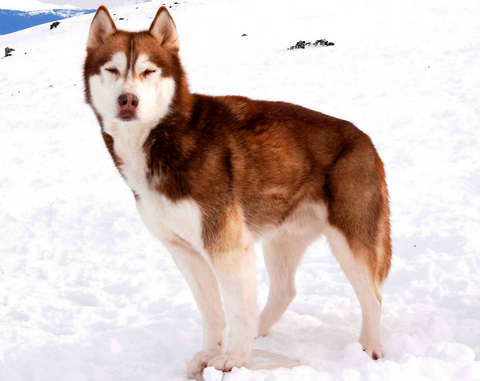Given the amount of screen time afforded a pack of handsome dogs cavorting, hunting, running and simply lying in the snow, you get the idea that Frank Marshall, director of the adventure film Eight Below, is a devotee of the March of the Penguins principle.
You're familiar with the principle. Its basic tenet proclaims that sometimes animals are more lively and exciting to watch than any two-legged performers who are paid for their services in something other than fresh fish or Alpo. In this case, the assumption would be correct. Imperiled or otherwise, Maya, Max and the gang of eight Alaskan huskies and malamutes that get left behind in Antarctica are considerably more diverting than Paul Walker, Jason Biggs and the other performers whose characters abandon the unfortunate canines.
That's no giant knock on Walker (the heartthrob star of Into the Blue and the Fast and the Furious flicks), whose character's quest to return to Antarctica gives Eight Below its dramatic spine. Walker's Jerry Shepard is an amiable enough guy, hunkish if a bit withdrawn. Most importantly for the purpose of this movie, the man clearly worships his pooches. Enough time spent with those great huskies (most of which are played by a couple of dogs apiece) and the film figures any audience member without a heart of flint will be equally besotted.

PHOTO: AP
The entertainment value of Eight Below is considerable, but I wonder about its credibility. Inspired by the 1983 Japanese film Nankyoku Monogatari -- another sled-dogs-left-behind yarn -- Eight Below and screenwriter David DiGillo suggest that the majority of these eight domesticated sled dogs managed to survive for more than six months in the most punishing of conditions through instinct, smarts and teamwork. Teamwork? Dogs are faithful and loyal, granted, but hunger is a powerful thing. You've got to wonder what's keeping these guys from trying to eat each other when the going gets rough (or ruff).
Before we get too far ahead of ourselves, here's the plot: A research team in Antarctica, the "bottom of the world," gets a visit from academic geologist Davis McLaren (played by Bruce Greenwood). McLaren is hunting for a meteor from Mercury, and guide Jerry and his mushers are recruited to lead the excursion. Mission is quickly accomplished, but injuries and a raging storm force Jerry and McLaren back to the base.
The research station is evac-uated for the remainder of the winter season, and there's no room on the rescue plane for any of the dogs. Katie (Moon Bloodgood), Jerry's on-again-off-again pilot gal pal, promises she'll go back for them. But the government -- and truly nasty weather -- intervenes, and the dogs are stuck. A brooding Jerry makes it his mission to return, even if it means discovering his pals as dogsicles.
This being a Disney movie, that's clearly not going to happen. The dogs burst their collars, learn to hunt birds, explore their snowy surroundings and have a rather terrifying encounter with an enormous tiger seal (depicted with animatronic exactitude by creature master Stan Winston). They spend a lot of time licking each other or burrowing their furry bodies against each other in the snow. Altogether now, everybody: aaawwwww!
Dog fanciers and lovers of white-out arctic-looking scenery (much of Eight Below was filmed in northern Canada) should be plenty pleased. Either way, Marshall's film is infinitely more substantial than, say, the execrable Cuba Gooding Jr. flick Snow Dogs, which featured some of these same Eight Below huskies. Good to know a dog can get a second chance in Hollywood.

No one saw it coming. Everyone — including the Chinese Nationalist Party (KMT) — expected at least some of the recall campaigns against 24 of its lawmakers and Hsinchu Mayor Ann Kao (高虹安) to succeed. Underground gamblers reportedly expected between five and eight lawmakers to lose their jobs. All of this analysis made sense, but contained a fatal flaw. The record of the recall campaigns, the collapse of the KMT-led recalls, and polling data all pointed to enthusiastic high turnout in support of the recall campaigns, and that those against the recalls were unenthusiastic and far less likely to vote. That

Behind a car repair business on a nondescript Thai street are the cherished pets of a rising TikTok animal influencer: two lions and a 200-kilogram lion-tiger hybrid called “Big George.” Lion ownership is legal in Thailand, and Tharnuwarht Plengkemratch is an enthusiastic advocate, posting updates on his feline companions to nearly three million followers. “They’re playful and affectionate, just like dogs or cats,” he said from inside their cage complex at his home in the northern city of Chiang Mai. Thailand’s captive lion population has exploded in recent years, with nearly 500 registered in zoos, breeding farms, petting cafes and homes. Experts warn the

A couple of weeks ago the parties aligned with the People’s Republic of China (PRC), the Chinese Nationalist Party (KMT) and the Taiwan People’s Party (TPP), voted in the legislature to eliminate the subsidy that enables Taiwan Power Co (Taipower) to keep up with its burgeoning debt, and instead pay for universal cash handouts worth NT$10,000. The subsidy would have been NT$100 billion, while the cash handout had a budget of NT$235 billion. The bill mandates that the cash payments must be completed by Oct. 31 of this year. The changes were part of the overall NT$545 billion budget approved

Before performing last Friday at Asia’s bellwether music festival, Fuji Rock in Japan, the Taiwanese indie band Sunset Rollercoaster (落日飛車) had previously performed on one of the festival’s smaller stages and also at Coachella, the biggest brand name in US music festivals. But this set on Fuji Rock’s main stage was a true raising of the bar. On a brilliant summer’s evening, with the sun rays streaming down over a backdrop of green mountains and fluffy white clouds, the performance saw the Taiwanese groovemasters team up with South Korean group Hyukoh, with whom they’ve formed a temporary supergroup called AAA